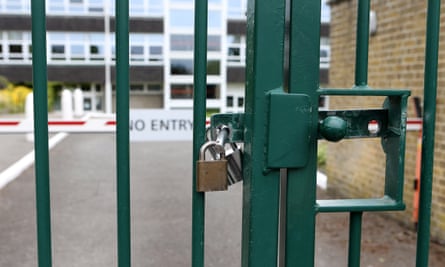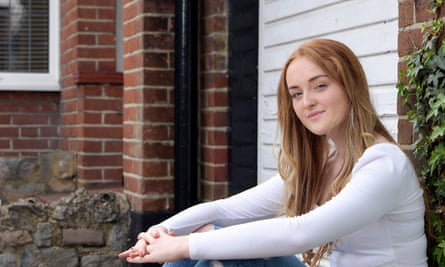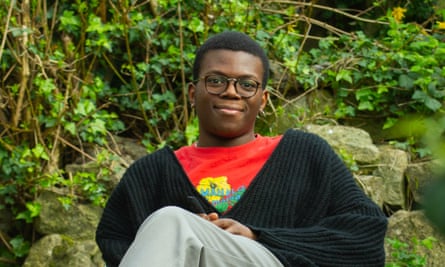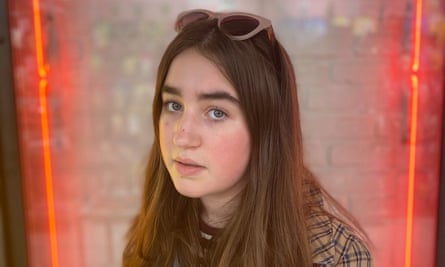When, in late February, Betsy Sheil turned 16, she thought she was staring down the end of secondary school, not the beginning of global pandemic.
“I was going to finish year 11 and do my GCSEs, then I was going to have a really long summer with my friends, hopefully go abroad – have that summer that everyone has.”
Weeks later, Betsy was bidding a rushed goodbye to her friends on their last day of school before it closed because of coronavirus.
“I’m sad about missing out on the stuff that everyone normally gets to do,” she says. “I didn’t have a proper leavers’ assembly, I didn’t get to properly say bye.”
Betsy is now many weeks into isolating with her parents at their family home in Nottingham, her holiday plans scrapped – along with her exams.
“I guess you’ve got the hope that the future is not confirmed yet, you don’t know how long it’s going to last – but that’s also what’s confusing about it all. It’s the knowledge that I’m losing my teenage years.” Betsy checks herself before adding: “Well – one or two years, probably.”
The coronavirus has affected all our lives, but six weeks since schools shut across the UK there is evidence that teenagers in particular are struggling.

A study of 60,000 people in lockdown by University College London found that the youngest in the sample, 18- to 24-year-olds, had the lowest levels of life satisfaction, while the highest was recorded in the over-60s.
“To some degree, this [the lockdown] is not a different experience for teenagers – but teenagers are more vulnerable,” says Dr Maria Loades, a senior lecturer and clinical psychologist at the University of Bath who studies the effect of social isolation and loneliness in young people.
It is easy to see why that may be the case. Exams young people have been told will shape the rest of their lives have been cancelled, future plans – for work, travel or further study – cast into uncertainty. Incipient independence has been rudely interrupted.
Physical distancing goes against adolescent impulse, says Loades: to assert themselves as individuals, away from their parents; to spend time with their friends, to take risks, to act without thinking of consequences.
“We’re asking teenagers to be very responsible and mature, and to make sensible decisions for the greater good of society,” she says. “I think that’s probably quite a conflict.”
Loades says school leavers in particular will be suffering the loss of milestones such as exams, last-day rituals such as shirt signing and leavers’ assemblies, and end-of-year parties.
“Those kinds of experiences help us to make sense of endings that might feel painful and difficult, and to move on from one stage of life to another,” she adds.
For many young people, the cancellation of exams comes not as relief, but as anticlimax. “Obviously no one really wants to do exams, but … there were subjects that I knew I could push myself in,” says Betsy.
She expects to pass her GCSEs on the strength of her mock exam marks, and is relieved she put in the effort. “You get told that your mock exams don’t mean anything – now it means a lot. For people who were going to try during ‘the real thing’, it’s probably quite hard.”
Others have already had to adapt to online learning. Charlotte Lewis, 17, from Shropshire, has had her entire timetable moved on to Microsoft Teams before her A-levels next summer. The learning curve has been steep: lessons are dense, self-directed and marred by technical difficulties.
“At school you can bounce off each other – it’s a lot harder to do that now,” she says. “We have some teachers who have never used the platform before, so we had to teach them.”
Her friend Josh Foster, also 17, says some people have already started muting the teacher and watching Netflix instead. “As long as they’ve logged into class,” she adds.
Josh says teachers seem to be overcompensating with homework, forcing him to cram until 2am and seek extensions to keep up.
“I feel that we’re quite hindered compared to last year’s year 12s.” Support from both his school and prospective universities has been lacking, he continues. “I’m in a position where I don’t know what to do to have the best chance of getting into a university.”
The economic fallout from the pandemic has already darkened the outlook for the 800,000 school leavers and graduates in the UK. The Resolution Foundation thinktank predicts that the “corona class of 2020” are the group most at risk of unemployment, and face long-term damage to their career and pay prospects.

Ava Twomey, 17, from south London, is having to reckon with her chosen industry going into freefall, just as she finished her Btec qualification.
She has dreamed of working as an airline cabin crew member since she was 13. “I really love travelling, airplanes, airports – I’m a bit obsessed.” British Airways was her first choice, after she did work experience there last year and “fell in love”.
But BA has been upended by the collapse in aviation, and recently set out plans to make up to 12,000 staff redundant. “It’s not looking too good at the moment,” says Ava, “but I’m trying to stay positive.”
Exercise helped, until she overdid the running and tore her tendon; now she FaceTimes her friends and binge-watches Made in Chelsea and The Only Way Is Essex. “It’s just so comforting,” she says apologetically.

Many teenagers have sought solace in Netflix. Betsy is storming through Gossip Girl at a rate of 2.5 series a week. Charlotte and her friends have watched the Twilight and Harry Potter films together using the Netflix Party app (“She made me watch Clueless,” says Josh, grumbling).
They used to go to Wetherspoons to do their homework, says Charlotte; now they gather on FaceTime and Zoom. “We’re just doing what we normally do, but online.”

Tope Olufemi, 19 , abruptly returned from his first year at the University of Warwick to his parents’ home in north London. He says screen time has gone “through the roof. People are on social media 24/7.”
Jakob McMaster, 17, from Belfast, has found it harder to adapt. He used to spend his days at school or outdoors, exploring abandoned buildings and forests with his friends.
“I don’t think I’ve stayed inside the house this long since I was 12 … We thrive off being outside.”
He has also been separated from his boyfriend of one year, who attends the same school. Before lockdown, the longest they had been apart was three days.
Two months into isolating with his parents and younger siblings, Jakob says he feels bored and uncharacteristically irritable, like “time is merging together”.
“I get peaks of motivation where it’s like: ‘I have all the time in the world, I should start baking!.’ But as soon as I get the stuff ready for it, I’m like: ‘This is meaningless – we’re just stuck here.’”
Jakob has had weekly therapy since he was 11, but now his sessions have been put on hold. He has noticed the impact of the loss of support and being confined on his depression: “I have the kind that makes me want to bounce off the walls.”
In mid-March the charity YoungMinds surveyed 2,100 people under 25 who had previously sought help for their mental health. More than four-firths (83%) agreed that the pandemic had made their mental health worse, and a quarter of those who had been accessing support said they were no longer able to do so.
The combination of being siloed with their family and separated from their friends has many young people living inside a pressure cooker, says Loades.
Her review of 63 studies on isolation and loneliness in teenagers suggested physical distancing was likely to put them at higher risk of depression, and probably anxiety. The longer the lockdown restrictions go on, the worse outcomes are likely to lead to, says Loades.
The long-term effects of isolation on teenagers will differ greatly by individual,as well as factors such as access to technology, amount of personal space and relationship with their family, says says Dr Amy Orben, a research fellow at the MRC Cognition and Brain Science Unit at the University of Cambridge. “We can already see inequalities arising.”
Orben predicts that teenagers will at least find being apart from their peers a negative experience. “The importance of the social world for adolescents can’t be overstated,” she says.
For some teenagers, the isolation coronavirus has caused is nothing new. Last year, research by the charity Mencap found one in three young people with a learning disability spend less than an hour outside their home on a typical Saturday.
Joey Mander, 21, is an NHS sterile services technician and youth activist in Coventry. He hopes one silver lining of the pandemic is recognition that “for some of us, this is just our ordinary”. At 16 he was diagnosed with hereditary spastic paraplegia, a rare genetic mutation, and now uses a wheelchair.
He says the restriction and loss of autonomy “the world has been forced to experience, is the very thing that people” with a disability face as part of their day-to-day experience.
For Mander, who also has autism, the pandemic has disrupted his routines and led to a cut in the hours of his support worker just as own his job has become more high-pressured than ever. “I’m having to fight very hard to get through each day.”
He has found solace in drawing – he is adapting Rosie the Riveter to show “a person in scrubs like mine” – and CYA Saturdays, a group of young disability advocates, now meeting twice weekly on Zoom. “I just want to touch someone’s hand. That’s what I keep saying,” says Mander.
Loades says it is important for teenagers to know coronavirus is a challenge for everyone – and that within that there may be opportunity to gain new perspectives, skills and maturity. Her previous research, on the experience of isolation by young people with chronic illness, has shown that “through adversity comes strength”.
Some teenagers are using lockdown to challenge themselves and support their family. Betsy often cooks dinner, and bakes “just for something to do”. Ava says she appreciates her friendships more, and has enjoyed the extra bonding time with her parents: “I’ve learnt more about them as people.”
Charlotte and her friends are each keeping journals on a different aspect of life during a pandemic: “It’s going to be quite interesting to look back and tell the kids about.”
She is interested in going into journalism, and coronavirus has proved a crash course in media literacy. “We’re thinking: is what we’re being told scaremongering? Is it actually as serious as they’re saying, or more serious?”
A survey by the US non-profit Common Sense Media on 13- to 17-year-olds’ response to the coronavirus pandemic found that about half were turning to news media for information, up from 30% last year.
For Tope, the lockdown has reinforced the importance of politics. “Even though it’s not affecting us equally, it’s affecting all of us.” He has been talking about the government response and mismanagement scandals with his friends. “A lot of people are realising that politics affects you on a daily basis, even if it doesn’t feel like it.”
With many teenagers concerned for their essential-worker parents or elderly parents, the stakes of the crisis are not lost on them. Nor is it the fact that it will pass – and sooner, if they follow the rules.

Betsy says most people she knows have been adhering to physical distancing. When one posted on social media about meeting up with their friends, the response was of anger.
“There was a lot of: ‘What do you not understand about not going out?’” she says. “A lot of people got quite vocal, just the ignorance of it. “Obviously the more people that go out, the longer we’re in it.”
Betsy is already looking forward to the party that will be thrown once this is all over. For now, she says: “Me not being able to hang out with my friends is not the biggest problem.”








